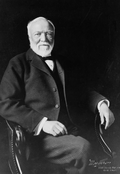A business magnate, also known as an industrialist or tycoon, is a person who has achieved immense wealth through the creation or ownership of multiple lines of enterprise. The term characteristically refers to a powerful entrepreneur and investor who controls, through personal enterprise ownership or a dominant shareholding position, a firm or industry whose goods or services are widely consumed. Such individuals have been known by different terms throughout history, such as robber barons, captains of industry, moguls, oligarchs, plutocrats, or tai-pans.
YouTube Encyclopedic
-
1/4Views:2 004 8981 050 35936 640103 266
-
Rockefeller: The World’s First Billionaire
-
The Most BRUTAL Businessman In History
-
The Mind of A Business Tycoon
-
Business magnate - Elon Musk
Transcription
Etymology and history
The term magnate derives from the Latin word magnates (plural of magnas), meaning "great man" or "great nobleman".
The term mogul is an English corruption of mughal, Persian or Arabic for "Mongol". It alludes to emperors of the Mughal Empire in Early Modern India, who possessed great power and storied riches capable of producing wonders of opulence, such as the Taj Mahal.
The term tycoon derives from the Japanese word taikun (大君), which means "great lord", used as a title for the shōgun.[1][2] The word entered the English language in 1857[3] with the return of Commodore Perry to the United States. US President Abraham Lincoln was humorously referred to as the Tycoon by his aides John Nicolay and John Hay.[4] The term spread to the business community, where it has been used ever since.
Usage
Modern business magnates are entrepreneurs that amass on their own or wield substantial family fortunes in the process of building or running their own businesses. Some are widely known in connection with these entrepreneurial activities, others through highly-visible secondary pursuits such as philanthropy, political fundraising and campaign financing, and sports team ownership or sponsorship.
The terms mogul, tycoon, and baron were often applied to late-19th- and early-20th-century North American business magnates in extractive industries such as mining, logging and petroleum, transportation fields such as shipping and railroads, manufacturing such as automaking and steelmaking, in banking, as well as newspaper publishing. Their dominance was known as the Second Industrial Revolution, the Gilded Age, or the Robber Baron Era.
Examples of business magnates in the western world include historical figures such as oilmen John D. Rockefeller and Fred C. Koch, automobile pioneer Henry Ford, aviation pioneer Howard Hughes, shipping and railroad veterans Aristotle Onassis, Cornelius Vanderbilt, Leland Stanford, Jay Gould and James J. Hill, steel innovator Andrew Carnegie, newspaper publisher William Randolph Hearst, poultry entrepreneur Arthur Perdue, retail merchant Sam Walton, and banker J. P. Morgan. Contemporary industrial tycoons include e-commerce entrepreneur Jeff Bezos, investor Warren Buffett, computer programmers Bill Gates and Paul Allen, technology innovator Steve Jobs, media proprietors Sumner Redstone and Rupert Murdoch, industrial entrepreneur Elon Musk, steel investor Lakshmi Mittal, telecommunications investor Carlos Slim, Virgin Group founder Sir Richard Branson, Formula 1 executive Bernie Ecclestone, and internet entrepreneurs Larry Page and Sergey Brin.
Business magnates
See also
- Bloomberg Billionaires Index
- Bourgeoisie
- Business oligarch
- Businessperson
- Chaebol
- Media proprietor
- Real estate investing
- Robber baron
- Software industry
- The World's Billionaires
- Russian oligarchs, the term for Russian business magnates
References
- ^ Cummings, Donald Wayne (1988). American English Spelling: An Informal Description. JHU Press. p. 277. ISBN 978-0-8018-3443-1. Retrieved 22 May 2012.
- ^ "tycoon". Merriam-Webster. Retrieved 22 May 2012.
Origin of TYCOON Japanese taikun
- ^ "tycoon". Merriam-Webster. Retrieved 22 May 2012.
First Known Use: 1857
- ^ Goodheart, Adam (10 November 2010). "Return of the Samurai". The New York Times. Retrieved 22 May 2012.
External links
- Lewis, Mark (December 13, 2001). "The Famous 15: America's Most Fascinating Tycoons". Forbes.
- "25 Tycoons Who Run the World". Business Pundit. October 6, 2010.
- "Finlayson juhlii klassikkokuosien merkeissä". MTV3.fi - Koti (in Finnish). Bonnier AB. January 18, 2010. Archived from the original on 2010-01-23.
































